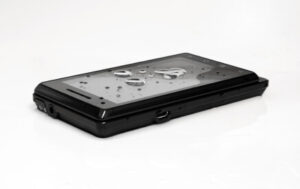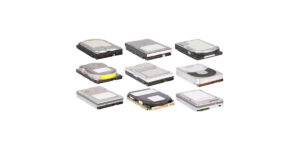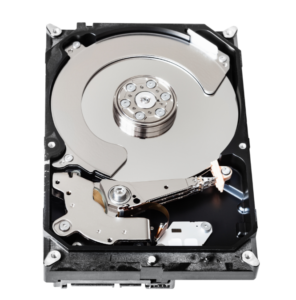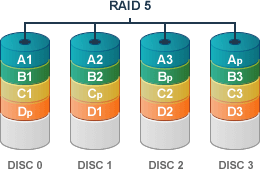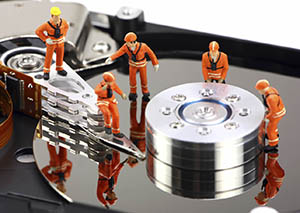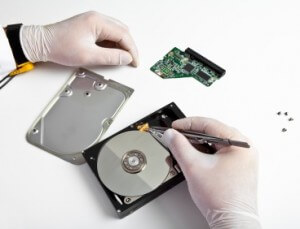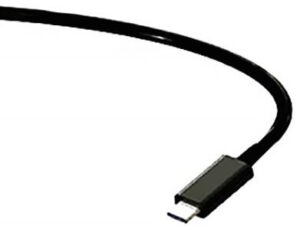TRUSTED EXPERTS
ANY DEVICE
Blog
Whether you dropped your phone in a puddle (or a toilet), or you’re an East Coast resident whose smartphone was damaged in Hurricane Sandy (or during the extensive relief and recovery efforts that followed), water damage is one of the worst — and most common — things that can happen to your phone. Fortunately, water damage to your smartphone doesn’t always mean your data is gone forever and your phone is a lost cause. Most SSD and flash memory used in phones are waterproof. It’s the other components that are susceptible to water damage. Sometimes, simply drying out your phone will fix any temporary damage. Other times, drying out the phone will permit you to turn it on long enough…
In our digital world, data loss can happen to anyone. When it does, resist the urge to attempt recovery yourself and turn to the professionals instead. In this guide, we’ll explain why it pays to rely on expert data recovery services. The Risks of DIY Data RecoveryIt’s natural to want to try recovering data on your own. However, this carries significant risks that can permanently destroy your files. DIY methods like software tools and physical repairs can often make things worse if you don’t know what you’re doing. You may inadvertently overwrite data during the recovery attempt or damage the storage device further. Leave It to the Experts Data recovery is a complex, technical process that’s best left to seasoned…
Hard disk drives (HDDs) have come a long way since their invention over 60 years ago. This blog post will explore some of the key milestones in the evolution of HDD technology. The First Hard Drives (1956-1970s) IBM invented the first hard drive in 1956. It was called the IBM 350 and was part of the IBM 305 RAMAC (Random Access Method of Accounting and Control) system. The 350 disk drive contained 50 platters that were 24 inches in diameter and weighed over a ton! Despite its large size, it only stored 5 MB of data. In the 1960s and 70s, HDD capacities and performance improved steadily but slowly. Drives typically stored anywhere from 5-100MB, with access times measured in…
That ominous clicking sound coming from your hard drive likely sent a chill down your spine. Hard drive clicks often signal serious problems that could result in permanent data loss if not handled properly. But take a deep breath – with the right approach, you can likely recover your precious files and photos. This article provides essential advice on what to do next. Understanding the Issue Hard drive clicks indicate mechanical failure. The read-write heads are struggling to access data on the platters. If misaligned, these delicate components could make contact with the platters and cause irreparable damage. Resist the Urge to Power On It’s natural to want to restart your computer and hope the issue resolves itself. But powering…
Don’t panic, but do power it down immediately. Physical shock can throw the internal components out of alignment and cause serious damage. The last thing you want to do is power up a damaged drive. Gently set the drive in a safe place and inspect the exterior. Are there any visible cracks, dents or broken plastic? This may indicate internal damage as well. If the enclosure looks intact, remove the drive and connect it directly to a computer if possible. This bypasses any damaged USB bridge board or enclosure components. Here’s the most important next step: listen closely to the drive once it’s powered down. Do you hear any unusual clicking, beeping, buzzing or grinding noises? These sounds typically signal…
When RAID arrays were first proposed by the minds at Berkeley in the 1980s, there were five levels of RAID array. Today, researchers and manufacturers have devised other variations of RAID levels, but the original five are considered, by purists, “true” levels of RAID. Of course, there’s also RAID “0,” which many experts don’t consider to be a RAID array but it’s worth discussing in this context. Read on to find out more about the five levels of RAID, plus one level that really isn’t. RAID 0 – RAID stands for Redundant Array of Independent (or Inexpensive) Drives. Therefore, RAID 0, which contains no redundancy, isn’t really a RAID level. RAID 0 stripes data across two or more drives, providing…
If you’ve lost data on your hard drive, have accidentally deleted files, experienced corrupt data or even a damaged sector, it may be tempting to use free data recovery tools. After all, it’s free – what have you got to lose? When you choose free recovery tools rather than calling a data recovery service provider you can trust, there is actually a lot to lose – including your data. Let’s look at some of the problems with this free software that might claim to safely retrieve all your files. Your Free Data Recovery Tools May Actually Delete Your Data If a file is accidentally deleted, it still exists on a hard drive – until other data overwrites it. When you install…
If you’re faced with a data loss emergency, you might be considering DIY recovery software v. a data recovery service provider. Let’s take a look at the pros and cons of this important choice. Note: If your hard drive is making clicking, whirring, or grinding sounds, or refuses to boot up, power down your computer immediately. Repeated attempts to turn on the computer or reboot it could cause permanent data loss. Once your computer is off, it’s time to consider your best course of action for recovering the lost data Using DIY Data Recovery Options: Pros Even professionals will admit there are a few benefits to DIY data recovery. It’s free or cheap – People looking to save money often turn to…
By: John G. Laskey, Security Researcher for the InfoSec Institute. About an Incident Response Plan An incident response plan is a company’s critical resource during a cyber attack or other computer disaster. These plans are usually created only after an attack occurs, but they’re needed to help prevent and mitigate cyber threats. They identify current risks, assess damage, and lay out the necessary steps to respond during a critical event. Business continuity plans should also address data recovery. Although they cost time and money upfront to create, they can save a company millions in damages by preparing personnel and systems for a possible attack. A recent report from Bryan Cave’s Global Data Privacy and Security team indicates that companies with an incident response plan…
There’s a new kid in town in the connectivity game, and he’s focused on speed rather than convenience. In 2001, Intel and Apple co-developed the Thunderbolt connector, a fatter and faster pipeline for data transfer. But it never took off, other than for high-end applications. Instead, the ubiquitous USB connector just keeps getting better and better. The latest incarnation of USB connectivity, USB-C, is compact, reversible (and we hear choirs of techie angels sing!) and handles power, data transfers and display output on the new MacBook. In an article published on TheVerge.com, an Apple spokeperson says, “As long as we were going to include a port for charging the new MacBook, we wanted to make sure it was the most…
![]() WOW... fantastic customer experience! Submitted a totally dead 1TB drive for recovery yesterday now its fully recovered before noon the next day! Exceptional customer service, and impeccable reputation. Thank you 24 Hour Data, ever so much for getting my valuable data recovered and back to me. Very reasonable rates. My hat goes off to the BEST data recovery service in Dallas or in the country for that matter! You will not be disappointed using their services....
WOW... fantastic customer experience! Submitted a totally dead 1TB drive for recovery yesterday now its fully recovered before noon the next day! Exceptional customer service, and impeccable reputation. Thank you 24 Hour Data, ever so much for getting my valuable data recovered and back to me. Very reasonable rates. My hat goes off to the BEST data recovery service in Dallas or in the country for that matter! You will not be disappointed using their services....
Mark Davis
Bear Technologies












